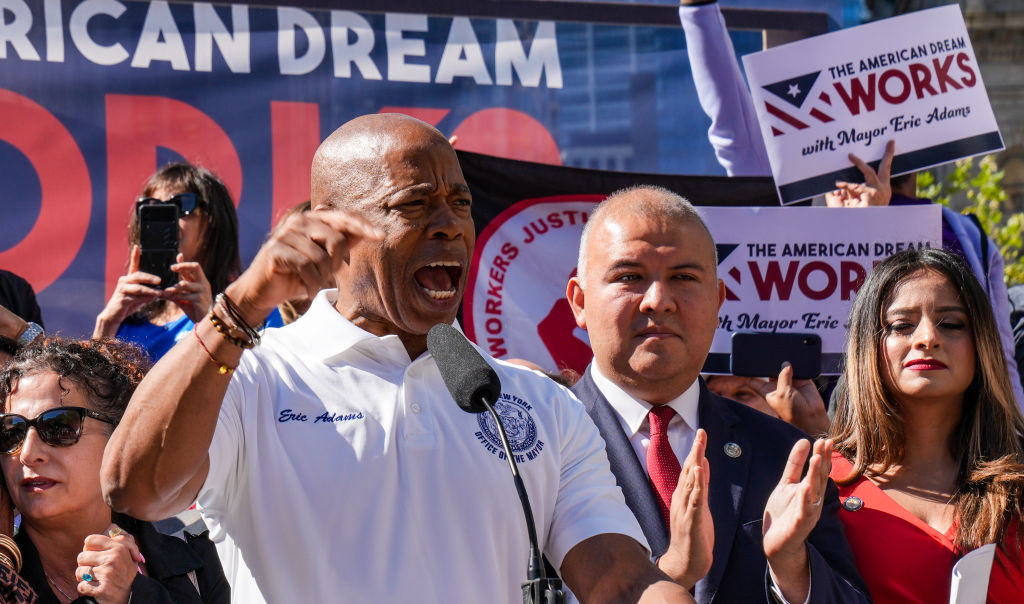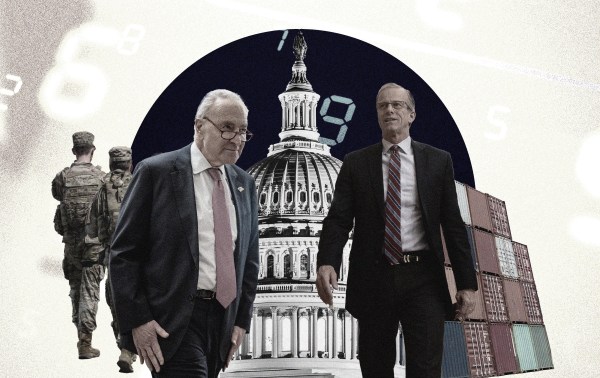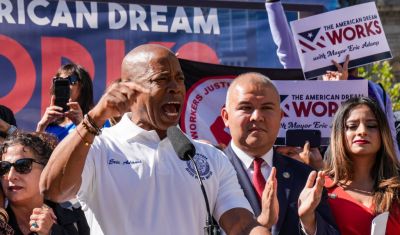Happy Friday! Fast food fans in Florida are accusing Burger King of telling a whopper … about the Whopper, which the plaintiffs in a class-action lawsuit say is up to 35 percent smaller in real life than recent advertising suggests.
Perhaps, rather than defend itself against the allegations, BK will let the customers have it their way, since—as they’ve told us so, so, so many times this year—we rule.
Quick Hits: Today’s Top Stories
- Ukrainian forces have reportedly breached the first of Russia’s main defensive lines this week near the village of Verbove, southeast of Zaporizhzhia. The advance would mark the first time the Ukrainians have penetrated the Russians’ highly fortified defensive lines and is raising cautious hopes for a breakthrough in the country’s counteroffensive.
- The Biden administration on Tuesday approved—for the first time—a military transfer to Taiwan under foreign military financing, a program typically reserved for grants to sovereign nations. State Department officials notified Congress they intended to obligate $80 million for Taipei, which Beijing considers to be a part of China, to purchase weapons but clarified to Reuters that aid offered under FMF did not indicate a change in the U.S. “One China” policy.
- Niger’s military junta ordered the country’s police to expel the French ambassador this week, noting that the visas for Sylvain Itte and his family had been canceled and giving them 48 hours to leave the country. The announcement followed a previous ultimatum from the junta, which Paris ignored, ordering France to recall the ambassador. A September 3 deadline looms for France to remove the 1,500 French troops stationed in the country.
- The Bureau of Alcohol, Tobacco, and Firearms moved Thursday to expand background checks on gun purchases by clarifying—and expanding—the definition of a gun seller. If the proposed rule enters into force, the measure, precipitated by last year’s Bipartisan Safer Communities Act, would tighten restrictions on gun sellers at flea markets, gun shows, and other secondary markets, setting stricter limits on how many firearms they can sell before being required to get a Federal Firearms License.
- President Joe Biden approved a disaster declaration for Florida on Thursday after Hurricane Idalia made landfall as a Category 3 storm on the state’s Gulf Coast earlier this week. After weakening to a tropical storm, the system barrelled through Southeast and caused a significant storm surge off the coasts of Georgia and the Carolinas, leaving hundreds of thousands of customers without power. Biden said he would tour the affected areas in Florida on Saturday.
- The Federal Reserve’s preferred measure of inflation, the personal consumption expenditures (PCE) price index, increased 3.3 percent year-over-year in July, the Bureau of Economic Analysis reported Thursday—up from a 3 percent annual rate one month earlier. Even after stripping out more volatile food and energy prices, core PCE increased at a 4.2 percent annual rate, well above the Fed’s 2 percent target. On a month-over-month basis, prices were up 0.2 percent—the same rate as June. Consumer spending, meanwhile, increased 0.8 percent in July, the strongest month-over-month increase since January.
- Former President Donald Trump pleaded not guilty on Thursday to racketeering and other charges filed in Fulton County, Georgia, related to his alleged efforts to overturn the state’s 2020 election. Trump entered his plea in a court filing and waived his right to an in-person arraignment, previously scheduled for September 6. In a separate filing, Trump also formally asked the judge to sever his case from that of his co-defendants seeking a speedy trial, on the grounds that his legal team would not have sufficient time to prepare their defense if they were bound to Fulton County District Attorney Fani Willis’ preferred October 23 trial date. Meanwhile, Georgia’s Republican governor, Brian Kemp, said Thursday he would not call a special session of the legislature to investigate Willis, despite requests from some GOP lawmakers in the state. “Up to this point, I have not seen any evidence that DA Willis’ actions or lack thereof warrant action by the prosecuting attorney oversight commission,” Kemp told reporters.
- Two leaders of the Proud Boys, Joseph Biggs and Zachary Rehl, were sentenced to 17 and 15 years in prison, respectively, on Thursday after they were convicted on charges of seditious conspiracy for their actions during the January 6, 2021, riot at the Capitol. Prosecutors sought sentences of 33 years for Biggs, whom they described as the “tip of the spear,” and 30 years for Rehl.
- Clarence Thomas’ financial disclosure report for 2022 was made public on Thursday, with the Supreme Court justice reporting three trips on private jets in 2022 funded by Dallas real estate mogul Harlan Crow: two to American Enterprise Institute conferences in Dallas (Thomas cited security concerns following the Dobbs opinion leak), and one to upstate New York. The disclosure came after the justice faced intense scrutiny this spring for previously unreported travel paid for by Crow. (Harlan Crow is a minority investor in The Dispatch and a friend of the founders.)
Democrats Feud Over New York’s Migrant Surge

In July 2021 the newly crowned Democratic nominee for mayor of New York City, Eric Adams, took a visit to the White House to meet with the president. Adams left the meeting happy, noting the White House calls him “the Biden of Brooklyn.” Both politicians had defeated more progressive primary challengers in part by presenting more moderate positions on crime and policing, and political observers heralded Adams’ victory as a blueprint for Democrats looking to fend off Republican attacks on crime.
But in recent months, the pair’s relationship has soured over a separate issue: immigration.
Over the last year, municipalities that have billed themselves as “sanctuary cities”—including Los Angeles, Denver, Chicago, Washington, and New York have seen a surge in immigration fueled in part by border states—such as Texas and Florida—bussing thousands of migrants to those cities. The Big Apple has received more than 100,000 asylum seekers since April 2022, according to the mayor’s office, and this April, Adams strongly criticized the Biden administration for not doing enough to help with the crisis. “The president and the White House have failed this city,” he said, a month before Biden’s reelection campaign dropped him as a surrogate. Meanwhile, the continuing struggle to deal with the influx of migrants at both the city and state levels is exposing rifts on immigration policy among New York’s local, state, and federal Democratic officials.
“Every single day, 300 to 500 asylum seekers come to New York City, and every single day, we scramble to find places to house them,” Camille Joseph Varlack, Adams’ chief of staff, said at a press conference last month outside the Roosevelt Hotel in Midtown Manhattan, which has functioned as the city’s “arrival center” for migrants. Earlier this summer, the city ran out of beds to house asylum seekers, forcing more than 100 people to sleep on the sidewalk outside the hotel before the city eventually partnered with a church in Long Island City to house them. But more than 58,000 asylum seekers remain in the city’s shelters.
In response, the city has opened more than 200 emergency shelter sites, including a tent city in the parking lot of a Queens psychiatric center, a hangar at JFK International Airport outfitted with beds, and shelters built at an airfield in Brooklyn. Deputy Mayor Anne Williams-Isom has even raised the prospect of using space in Central Park to arrange temporary shelter. But the city’s creative efforts—which have faced protests from residents near the shelter sites—have a limit. Adams has estimated that the cost to care for all of the people could exceed $12 billion by the summer of 2025, and the flow of migrants doesn’t show signs of slowing down: A record number of migrant families crossed the U.S.-Mexico border in August, according to preliminary data obtained by The Washington Post.
“Quite honestly, while our compassion is limitless, our resources are not, and we’re out of miracles,” Adams said last month. A limited number of people have been bussed upstate, but New York Gov. Kathy Hochul has insisted the city should limit the number of migrants it’s moving out. “We cannot and will not force other parts of our state to shelter migrants, nor are we going to be asking these migrants to move to other parts of the state against their will,” she said in a speech last week. Hochul’s position drew a sharp public rebuke from Adams Tuesday. “I think the governor’s wrong,” he said. “She’s the governor of the state of New York. New York City is in that state. Every county in this state should be part of this.” The city and state traded letters criticizing each other’s response to the crisis last month, as well.
Hochul and Adams are, however, on the same page about the need for more support from the federal government, particularly financially: Washington has contributed $145 million in funding, but the city is spending almost $300 million every month to care for migrants. Hochul asked Biden for more support last week, and several members of New York’s congressional delegation echoed the call. In an apparent response, the Department of Homeland Security sent letters to Adams and Hochul on Monday, criticizing structural and operational issues with how New York is handling migrants. “Don’t tell us how we could have done it better,” Adams said at a rally Thursday. “This is a national issue.”
The infighting is frustrating some immigration advocates. “You have three different levels of government here that each has some responsibility, and inevitably they want the other level of government to do more,” Joshua Goldfein, a staff attorney with Legal Aid Society’s Homeless Rights Project, said last week.
Both Adams and Hochul, along with other New York leaders, have gravitated toward expedited work permits as a way to ease the strain of the crisis. “We must expedite work visas,” Adams said Thursday. “Thousands of jobs are available to be filled, to provide the services we need in this city, this state, in this country. And to have a new wave of individuals coming here to participate in the American dream says it all. This is who we are as a country.” The language represents a pivot from Adams’ harsher rhetoric; he previously went so far as to say the city is being “destroyed” by the migrant crisis. Conservative commentators were quick to note the irony of a leading Democratic figure speaking on immigration issues in language typically used by Republicans or officials in border towns facing large influxes of migrants.
But securing work visas will face legal hurdles. Federal law prevents asylum seekers from working until six months after they have filed their asylum claim, which is reportedly limiting the Biden administration’s ability to speed up the process. Hochul met with White House senior staff Wednesday to discuss the issue (Biden was notably absent), and the administration agreed to send teams to New York City to help migrants who are currently eligible but haven’t yet applied for work permits. “This is a critical first step but make no mistake: it is not enough to fully address this crisis or provide the level of support that New Yorkers need and deserve,” Hochul said in a statement after the meeting.
Even if the work visa process is expedited, some policy analysts don’t believe it would make a significant dent in the problem. “Receiving work authorization also doesn't necessarily mean that migrants will exit the shelter system—New York’s shelter population has long had a contingent of employed people—and might even encourage more foreigners to risk the perilous journey to the U.S. for the promise of an easy work permit,” John Ketcham, the director of state and local policy at the Manhattan Institute, tells TMD. He argues that, while the migrant crisis is the product of many factors including an outdated immigration system and a porous Southern border, New York’s generous shelter policies play a role in attracting migrants to the city. “By now, it’s clear that New York City’s right to shelter is attracting economic migrants seeking a place to stay at government expense.” New York City is required by a 1981 consent decree to provide shelter to anyone who asks, making it difficult for the city to adjust its policies with the surge of migrants, though Adams’ new chief counsel is reportedly exploring legal strategies to roll back the right-to-shelter.
New York Democrats are also likely concerned about the political consequences of the migrant crisis heading into 2024. A Siena College poll of registered voters in New York state published last week, for example, found that 82 percent of respondents believe that the influx of migrants is a serious problem, and 58 percent want to slow the flow of people into the state, and some New York Republicans are already making use of Adams’ comments criticizing the Biden administration. The handful of House seats that Republicans flipped in the 2022 midterms could mean the difference between a Democratic and Republican House majority after the 2024 election.
But short of immigration reform or legal changes, the problem is here to stay, “placing New York in the difficult position of providing shelter, public schooling, and other services to a potentially unlimited number of migrants during the interim,” says Ketcham. “Resolving the crisis is going to take a long time.”
Worth Your Time
- For Tablet magazine, Samantha Shokin—who, for much of her life considered herself of Russian Jewish origin—describes what some old family letters revealed about her Ukrainian heritage. “On paper, my great-grandfather, Hersh, had died missing-in-action during the Nazi invasion of Kyiv,” she writes. “Or at least that’s what my mother had always told me, with the caveat that nobody really knew, or could ever know, what happened. If he hadn’t been killed while serving in the militia, he must have been among the 33,771 Jews who had been rounded up and shot at Babyn Yar,” a ravine in Kyiv. Shokin discovered letters placing Hersh in the Ukrainian capital—and not in some far-away forest—in August and September 1941 when the Nazis took the city, making it almost certain he was a victim of the Holocaust. “‘We won’t surrender Kyiv. We will fight until the last drop of blood,’” her great-grandfather had written at the time. “The words felt chillingly familiar against the backdrop of today’s war. My grandmother, Baba Raisa, visited the memorial with her mother before immigrating to America. She had been outraged by the monument’s generic inscription, which failed to mention that the victims had been primarily Jewish. Since then, the Ukrainian government has officially recognized the event as a Jewish tragedy, and an important part of the nation’s history. Like my great-grandfather, the Jews who perished at Babyn Yar may not have identified as Ukrainians, but their descendants fighting on the front lines today do—a testament to the inextricable histories of both people.”
Presented Without Comment
Reuters: Ukraine Tells Critics of Slow Counteroffensive to ‘Shut Up’
Also Presented Without Comment
New York Times: Desantis Super PAC’s Urgent Plea to Donors: ‘We Need 50 Million Bucks’
Also Also Presented Without Comment
Quartz: The Feds Are Looking Into Whether Tesla Funds Were Used to Build a Secret Glass House for Elon Musk
Toeing the Company Line
- The application for The Dispatch’s fall internship is still open! Click here to apply, or pass it along to someone you think would be a good fit for the position.
- In the newsletters: In The Collision, Mike explains Trump and his Georgia co-defendants’ efforts to move their trial out of Fulton County and to the federal system, and Nick offers (🔒) a mea culpa and a handful of reasons why Vivek Ramaswamy didn’t see a post-debate bump.
- On the podcasts: Jonah and Steve join Mike on the Dispatch Podcast to discuss China, big-dollar donations, and Kari Lake.
- On the site today: Price examines whether Ramaswamy’s answer on how he would have handled January 6 makes any sense.
Let Us Know
Who should bear the brunt of caring for migrants who surge into a community—state and local officials or the feds?







Please note that we at The Dispatch hold ourselves, our work, and our commenters to a higher standard than other places on the internet. We welcome comments that foster genuine debate or discussion—including comments critical of us or our work—but responses that include ad hominem attacks on fellow Dispatch members or are intended to stoke fear and anger may be moderated.
With your membership, you only have the ability to comment on The Morning Dispatch articles. Consider upgrading to join the conversation everywhere.